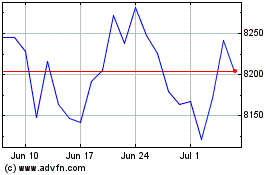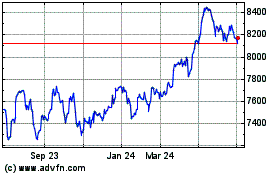By David Ricketts
Of Financial News
It is shaping up to be a standout year for shareholder activism,
with the impact of the Covid pandemic and the lingering fallout
from Brexit expected to make the U.K. an ideal battleground for
corporate agitators.
"This is the golden age of activism in the U.K.," said Liad
Meidar, a managing partner at activist investor Gatemore Capital
Management. "It is currently the best activist market in the
world."
According to professional services firm Alvarez & Marsal, 59
U.K. companies are at risk of becoming activist targets, accounting
for 38% of all those considered "at risk" in Europe.
There is "pent-up demand" from previously reluctant activists,
who feared launching campaigns amid ongoing uncertainty and the
risk of appearing tone-deaf to greater societal challenges,
suggests Alvarez & Marsal.
But with restrictions easing and the vaccine rollout ramping up,
activist investors are looking to fire up activity and begin
targeting companies that have been left in weak positions.
"There was a hiatus with Brexit," a senior executive at a
European activist investor said. "But people are past that and
think now is a good time to look again at the U.K., particularly
given the low valuations. It makes sense that the U.K. will see a
lot of activity."
In the U.S., activism has made stars out of hedge fund managers,
including Pershing Square Holdings Ltd.'s Bill Ackman, David
Einhorn of Greenlight Capital Inc and Trian Fund Management LP's
Nelson Peltz.
Activist stars are rarer on this side of the pond and the image
of their effectiveness has no doubt been harmed by Sherborne
Investors' notable flop campaign against Barclays PLC over the past
few years. One of the big reasons activists have U.K. companies in
their sights now: They have been worse hit by Covid than many of
their peers in continental Europe.
"We see significant value opportunities in part from the
overhangs of Brexit, MiFID II and even the Woodford collapse, which
has particularly hit small-caps, said Mr. Meidar.
Another factor that makes the U.K. market more appealing than
others, according to Mr. Meidar, is the extent to which there are
uniform minority shareholder rights.
"This makes the U.K. far more conducive to generating change,"
he said.
Kirshlen Moodley, managing director in BNP Paribas SA's U.K.
M&A advisory team, said despite a slowdown in campaigns
launched in the U.K. and Europe during the past year, the U.K. was
now ideal territory for activist funds.
"There are many companies in the U.K. at the forefront of
strategic reviews that are in place to robustly drive valuation
enhancement, but equally provide a good opportunity for a fund to
enter the ownership and purport to accelerate this."
He added: "Large passive funds are becoming more vocal and
supportive of change that will drive value unlock in the medium to
long term--which an activist fund can help accelerate, sometimes
with the tacit support of shareholders."
Covid hasn't dampened activity among some activists, with
several notable campaigns waged in the U.K. over the past 12
months.
PrimeStone Capital wrote to St James's Place PLC in October,
calling on the U.K. wealth manager to overhaul its "bloated
organizational structure" to improve returns for shareholders.
The Mayfair-based investor, which holds a 1% stake in SJP, said
the FTSE 100-listed company had "failed to deliver meaningful value
for shareholders" over a five-year period and singled out its
"overly generous" pay structure, claiming it had more than 120
employees with "head of" in their job titles.
PrimeStone later said there had been "productive and
constructive dialogue" with SJP, which went on to announce it would
cull 200 jobs and simplify its operations. The wealth manager's
share price has risen by more than 27% this year.
Elsewhere, the U.K. pharmaceuticals giant GlaxoSmithKline PLC
has found itself in a brawl with Elliott Management Corp., after
the U.S.-based hedge fund--run by billionaire Paul Singer--built a
multi-billion pound stake in the firm earlier this year.
Glaxo's Chief Executive Dame Emma Walmsley is expected to tell
shareholders that she has what it takes to lead a break-up of the
drugs company next year, amid rumors that Elliott is vying for a
shake-up among top management.
More recently, Cevian Capital, one of Europe's largest
activists, has built a 5% stake in U.K.-listed insurer Aviva PLC.
It has called on the company to cut costs and return 5 billion
pounds ($6.97 billion) of excess capital to shareholders.
Malcolm McKenzie, managing director and head of European
corporate transformation services at Alvarez & Marsal, said
U.K. companies are at the top of activists' hit lists.
"There are clear signs of pent-up demand starting to be
unleashed after activity slowed during the pandemic," said Mr.
McKenzie.
"There is no doubt that the corporate disruption caused by the
pandemic has created both challenges and opportunities for U.K.
companies, even those in sectors seen to prosper during the
pandemic."
High-growth companies in sectors such as healthcare and tech are
among those that activists have in their sights. Despite most of
these companies growing revenues, they have failed to meet
expectations on profits, said Mr. McKenzie.
"Combine these sector issues with a broader underperformance by
U.K. corporates over the past year, plus the U.K.'s more
activist-friendly regulatory environment, and you have the perfect
storm for activist intervention," he said.
Now U.S. investors are looking with increased interest at listed
companies in the U.K. and continental Europe, said Tom Matthews,
head of the global shareholder activism practice at White &
Case LLP.
"While that might have tailed off a bit last year as activists
gave companies a chance to deal with Covid, 15 months on from the
start of the pandemic, we are now seeing the emergence of winners
and losers," he said.
"There is a perfect storm of conditions attracting them to the
U.K. If you look at valuations of U.K.-listed companies versus
their U.S. equivalents, the U.K. is significantly cheaper.
Factoring in the dollar/sterling exchange rate, U.K. pricing
continues to look attractive."
However, some long-standing campaigns ran out of steam during
the pandemic.
Sherborne Investors announced in May that it had sold its entire
6.01% stake in Barclays, bringing an end to a three-year battle the
activist had waged with the U.K. lender's Chief Executive Jes
Staley.
Sherborne, which is led by Edward Bramson, had consistently
called for Barclays to shrink its investment bank, since taking a
stake in the U.K. lender in 2018. Mr. Bramson had also pushed for
Mr. Staley to go, latterly saying his links with convicted
pedophile Jeffrey Epstein should lead to his resignation. The
activist also tried to gain a seat on Barclays' board in 2019.
Sherborne ultimately failed to win support from other
shareholders, who gave their backing to Mr. Staley and strong
performance at the bank. In the first quarter of 2021, profits at
Barclays' investment bank were up by 54% to GBP1.3 billion as
trading and advisory revenues increased.
Despite the acrimonious relationship between Sherborne and
Barclays, Mr. Meidar said "hostile attitudes towards activism" are
changing in the U.K., with a growing acceptance of what investors
are trying to achieve.
The U.K. is also more of a civil environment, according to Mr.
Meidar, who says this "helps to produce a war of ideas rather than
a war of personalities."
Mr. Matthews added: "Five years ago, if you said the word
'activist' in the U.K., people would have perhaps reacted
negatively. That's changed. As activism has increased and the
sophistication of campaigns has improved, there has been an
increased understanding by boards and among the wider shareholder
base about what they are trying to achieve."
Website: www.fnlondon.com
(END) Dow Jones Newswires
June 22, 2021 10:04 ET (14:04 GMT)
Copyright (c) 2021 Dow Jones & Company, Inc.
FTSE 100
Index Chart
From Mar 2024 to Apr 2024

FTSE 100
Index Chart
From Apr 2023 to Apr 2024
